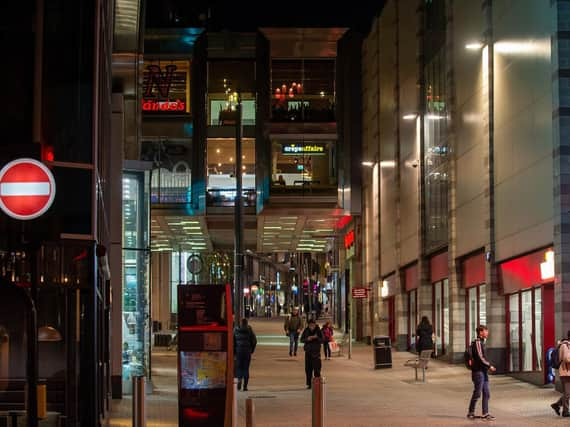Police investigating 'spiking by injection' case in Leeds as students boycott nightclubs


It follows similar movements at universities across the country after reports of a rise in drink spiking and spiking by injection.
West Yorkshire Police has confirmed that it is investigating one case of spiking by injection in Leeds.
Advertisement
Hide AdAdvertisement
Hide AdMembers of the University of Leeds student radio set up the 'Girls Night In' page on Instagram in response to the issue and are supporting a call for students to boycott venues on Wednesday, October 27.


Leeds Student Radio members Isabel Davies, Izzy Broadhurst and Joscelin Story hope the move will place pressure on venues to tackle the issue of drink spiking
Since starting the account, which already has more than 2,300 followers, the women say they have been inundated with messages from people sharing their experiences of spiking in Leeds - including photographic evidence of people being spiked by injection.
Joscelin, 20, a second-year International Relations student, said: “People have been anonymously sending in their first-hand experiences of drink spiking in Leeds and in just two days we've had hundreds of responses come back, naming multiple different clubs.
Advertisement
Hide AdAdvertisement
Hide Ad“A lot of the same names kept coming up over and over again and not just spiking but sexual assault.
“This is all just in the past two weeks so we can't imagine what it's like on a wider scale in student cities.”
She added: “We've had photos sent in of the marks left on girls bodies after being injected.
"Their friends have taken the photos to document it because otherwise the issue is that its near impossible to get any kind of justice because it's so hard without proper CCTV and most date-rape drugs aren't easily detectable so it's really hard to prove that you've been spiked.”
Advertisement
Hide AdAdvertisement
Hide AdIzzy Broadhurst, 20, a third-year media and communications student, said: “I'm in my third year so I went out in the first year and it was nowhere near as much of an issue or it wasn't spoken about.
“It really has been over this summer since clubs have reopened and with the injections that this has suddenly become such a big issue.
“I think that spiking is definitely getting worse.
“Everybody knows somebody who has been spiked. It's not an irregular thing.
"It happens all the time on most nights out and it is scary.
Advertisement
Hide AdAdvertisement
Hide Ad“It's definitely an issue that's getting worse and it's something that everyone is aware of it's a cause for concern.”
The group hopes that the financial pressure of the boycott on bars and clubs will incentivise the venues to act and take measures to prevent spiking and equip staff with the appropriate training to deal with people who have been spiked.
A few clubs and club night organisers have already been in touch with the women to tell them what measures they are going to take to support the movement, including security training and providing lids to cover drinks.
Isabel Davis, 20, second year economic and geography student, said: “The boycott idea originated from the fact that, sadly, a lot of events spaces, not all, but definitely a select few, aren't going to start taking the issue seriously until they see an impact in revenue.
Advertisement
Hide AdAdvertisement
Hide Ad“It's not about punishing the venues, it's about them seeing how many people don't feel safe coming out and to realise how big of an issue this is.”
Joscelin said: “It's going be a very difficult process to eliminate spiking as a whole, there's always going to be someone out there to ruin someone's night.
“What we're really trying to push for is more security training in how to look after people that have been spiked because we find that there's a lot of victim blaming that goes on.
“You’re kicked out of clubs, even if you've been spiked, and not taken seriously, so people are in positions where they’ve been kicked out of clubs and are extremely vulnerable.”
Advertisement
Hide AdAdvertisement
Hide AdIsabel added: “Especially in Leeds the buses aren't that reliable and recently have taxi's haven't been reliable either, so it can be quite tricky having to make your way back home if you are kicked out and all your friends are inside.
“We want better systems in place.
“This is a boycott for everyone, this is a national movement. We’re called 'Girls Night' In but we're not just for girls, it's for men, trans people and non-binary people too. It happens to everyone.”
Izzy said: “People really aren't just going to wait around for this issue to solve itself.
“We want clubs to take action and really put something in place to help the people that go to their clubs.”
Advertisement
Hide AdAdvertisement
Hide AdAs part of the 'Girls Night In', Leeds Student Radio will host a five hour radio broadcast with music and panel discussions about the issue.
West Yorkshire Police has received one report of ‘spiking by injection’, reported to have occurred in Leeds city centre on October 13, 2021.
Enquiries are currently ongoing into the incident.
Detective Superintendent Paula Bickerdike, of West Yorkshire Police’s Safeguarding Central Governance Unit, said: “We understand the genuine concerns that women have around their safety, particularly in the night-time economy, and we remain absolutely committed to doing everything we can alongside our partner agencies to make the county a safer place for women and girls.
“We continue to work alongside partner agencies and licensees to warn and educate people about staying safe on a night out, and we conduct regular partnership operations to keep people safe.”
Advertisement
Hide AdAdvertisement
Hide AdPolice elsewhere are investigating reports of people being spiked by injection in the Edinburgh, Dundee and Glasgow areas, while Nottinghamshire Police said it has seen a rising number of reports of spiking over recent months.
Groups from more than 30 universities around the UK have joined an online campaign calling for the boycott of nightclubs.
Campaigners say they are seeking “tangible” changes to make night-time venues safer, such as covers/stoppers for drinks, better training for staff and more rigorous searches of clubbers.
A petition to make it a legal requirement for nightclubs to thoroughly search guests on entry, started last week, has already gained more than 120,000 signatures.
Advertisement
Hide AdAdvertisement
Hide AdLarissa Kennedy, president of the National Union of Students (NUS), said: “It’s absolutely disgusting that in the past few days a number of students have reported instances of women being spiked on nights out.
“My rage, love and solidarity goes out to all those who have been impacted by these violent acts, and all other women and marginalised folks who experience sexual violence on our campuses and in our communities.”
Drink-spiking
The symptoms of drink spiking vary depending on what you’ve been spiked with.
'Date-rape drugs' like Rohypnol and Gamma Hydroxybutyrate can be odourless, colourless and tasteless.
Advertisement
Hide AdAdvertisement
Hide AdThey also leave the body within a short amount of time making them hard to detect.
Recreational drugs like Ecstasy, Lysergic Acid Diethylamide (LSD), Ketamine and other ‘party-drugs’ are sometimes used to spike alcoholic drinks, according to Drink Aware.
The symptoms of drink spiking include; slurred speech, visual problems, confusion, nausea, vomiting, loss of balance, lowered inhibitions and unconsciousness.